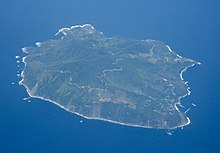The Mishima Islands (三島列島 Mishima-rettō) are a small archipelago in Japan, south of Kyushu and north of the Amami Islands.
Understand
[edit]
The Mishima Islands are the northernmost bit of the Satsunan Islands chain that extends from Kagoshima down via the Amami Islands and Okinawa as far as Taiwan. Lightly inhabited, with a total population of only around 500 people, they're visited mostly by hot-spring fans coming down from the mainland. The name literally means "Three Islands", and the three are:
- Takeshima (竹島) or "Bamboo Island", the closest to the mainland
- Iōjima (硫黄島) or "Sulphur Island", highly volcanic with several hot springs; same name but not the same place as the Iwo Jima of World War II fame
- Kuroshima (黒島) or "Black Island", better described as green and sometime dubbed Yakushima in miniature
The Mishima Islands are sometimes included in the nearby Tokara Islands chain.
Tourist information site
[edit]These islands are administered as one municipality, Mishima Village (三島村).
- The village's official site has a Japanese-only tourism section.
Get in
[edit]
There is only one practical way to get to the islands: the Mishima (みしま), tel. 099-222-3141, which sails between Kagoshima and the islands three times a week. The Kagoshima office and terminal are located near Kagoshima centre (Map)
Travel time from Kagoshima is 3 to 6 hours depending on the island, and the ferry overnights at Kuroshima before heading back. As of December 2011, the 3 departures per week from Kagoshima are M W and either F or Sa at 09:30, with returns at 08:00 the following day, but there are frequent scheduled changes and occasional weather-related cancellations. Contact the ticket office directly for an up-to-date schedule (Japanese only). Allow time in your schedule for an unplanned overstay on the islands due to the weather.
The ferry stops on both sides of Kuroshima, first at the village of Osato (大里) and then overnighting at Katadomari (片泊). Fares are fixed at ¥7000 (1st class), ¥3500 (2nd), one-way for any trip between the mainland and the islands, or ¥2200 (1st class), ¥1100 (2nd), for travel between any of the islands.
Get around
[edit]Since the Mishima is the only way to travel, island-hopping is time-consuming: once you get on an island, you're generally stuck there until it comes back.
Deciding how to get around that island is easy enough, since there are no buses, taxis, rental car, rental motorbike or even rental bicycle services: your only choice is to walk. However, most minshuku are located near the port, and those that aren't will usually pick up guests.
See
[edit]Most of Mishima's few sights are connected in one way or another to the epic clashes between the clans of Genji and Heike in the early 12th century, leading into the defeat of the Heike and their fleeing to — possibly — these islands. After the Heike defeat, some exiles were sent to an island called Kikai-ga-shima (鬼界ヶ島), which has been identified with Iojima (and several other places, including the island of Kikai much further away in the Amamis). An even more fanciful legend proclaims that six-year-old Emperor Antoku, generally believed to have drowned at sea in the Battle of Dannoura in 1185, in fact survived and drifted to Iojima, where his descendants (now in the 34th generation) still live!
- Kuroki Goshoato (黒木御所跡), Iojima. The house where Emperor Antoku and his descendants are said to have lived. Exhibits are limited to a few musty scrolls claiming to record the genealogy.
Do
[edit]
The islands are very volcanic and they all have public hot springs, although this mostly just means free, open-air, concrete tubs, but a couple have facilities and token entrance fees (¥200-300).
- Sakamoto Onsen (坂本温泉), Iojima (15 min from port by car). A natural seaside hot spring where the water bubbles out at 50°C, which is too hot to bathe in -- except during and after high tide, when seawater is mixed in, making the temperature bearable! At high tide, water depth can reach 1.5 m, so it doubles as a heated pool as well.
Scuba diving is one of the main draws for the few visitors in these parts.
The islands' big event is on the first Saturday of August, when the Mishima Yacht Race takes place. Plenty of spectators flock from the mainland, with parties after the race, and everything booked up well in advance.
Buy
[edit]There are no ATMs or banks on the islands, so bring enough cash to tide you over.
Eat & Drink
[edit]In addition to the obvious seafood, many islanders engage the cultivation of shiitake mushrooms, bamboo shoots (takenoko) and Kuroshima cattle.
On most islands, you'll be eating and drinking at your lodgings, but there is precisely one other option:
- Kameriya (花女里家), ☏ +81 9913-2-2015. Cafe, restaurant and pub rolled into one. Open 09:00-17:00 daily, plus 20:00-00:00 only on those nights when the ferry arrives.
Sleep
[edit]All islands are equipped with a couple of minshuku, which are usually just spare rooms in fisherman's houses. Mishima Village maintains a complete lodging list. All prices here are per person and include three meals unless otherwise noted. Advance reservations are necessary.
Camping is possible on Iojima, which has a free, shower-equipped campground near one of the onsen.

